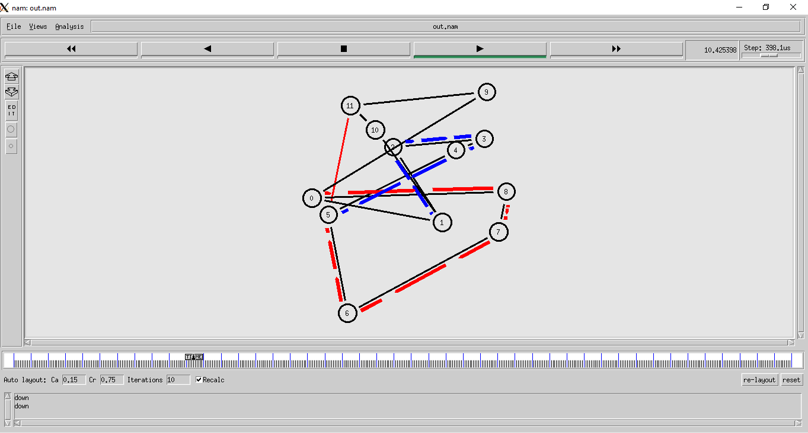Contents
Aim
To implement Link State Routing algorithm.
S/W required
NS2
Background information
The Link State Routing Algorithm is an interior protocol used by every router to share information or knowledge about the rest of the routers on the network. The link state routing algorithm is distributed by which every router computes its routing table. With the knowledge of the network topology, a router can make its routing table.
The routing table created by each router is exchanged with the rest of the routers present in the network which helps in faster and more reliable delivery of data. This information exchange only occurs when there is a change in the information. Hence, the link state routing algorithm is effective.
With the knowledge of the network topology, a router can make its routing table. Now, for developing the routing table, a router uses a shortest path computation algorithm like Dijkstra’s algorithm along with the knowledge of the topology.
A router does not send its entire routing table with the rest of the routers in the inter-network. It only sends the information of its neighbors. A router broadcasts this information and contains information about all of its directly connected routers and the connection cost.
Now, the process of transferring the information about a router’s neighbors is termed flooding. A router transfers the information to all the inter-network routers except its neighbors. Every router that receives the information sends the information copies to all its neighbors. In this way, all the routers of the inter-connected network have the same copy of the information.
OSPF or Open Shortest Path First is a routing protocol that uses the link state routing algorithm to exchange information (about neighboring routers, cost of the route, etc.) among the inter-network routers.
Activity
Program
#Create object for Simulator class
set ns [new Simulator]
#Initialization script
set tracefile [open out.tr w]
$ns trace-all $tracefile
set namfile [open out.nam w]
$ns namtrace-all $namfile
#Assign colors to traffic flows
$ns color 1 Red
$ns color 2 Blue
#Termination script
proc finish { } {
global ns tracefile namfile
$ns flush-trace
close $tracefile
close $namfile
exec nam out.nam &
exit 0
}
#Creating nodes
for {set i 0} {$i < 12} {incr i 1} {
set n($i) [$ns node]
}
#Creating links
for {set i 0} {$i < 8} {incr i} {
$ns duplex-link $n($i) $n([expr $i+1]) 1Mb 10ms DropTail
}
$ns duplex-link $n(0) $n(8) 1Mb 10ms DropTail
$ns duplex-link $n(1) $n(10) 1Mb 10ms DropTail
$ns duplex-link $n(0) $n(9) 1Mb 10ms DropTail
$ns duplex-link $n(9) $n(11) 1Mb 10ms DropTail
$ns duplex-link $n(10) $n(11) 1Mb 10ms DropTail
$ns duplex-link $n(11) $n(5) 1Mb 10ms DropTail
#Creating UDP, Null agents and CBR applications
set udp0 [new Agent/UDP]
$ns attach-agent $n(0) $udp0
set cbr0 [new Application/Traffic/CBR]
$cbr0 set packetSize_ 500
$cbr0 set interval_ 0.005
$cbr0 attach-agent $udp0
set null0 [new Agent/Null]
$ns attach-agent $n(5) $null0
$ns connect $udp0 $null0
set udp1 [new Agent/UDP]
$ns attach-agent $n(1) $udp1
set cbr1 [new Application/Traffic/CBR]
$cbr1 set packetSize_ 500
$cbr1 set interval_ 0.005
$cbr1 attach-agent $udp1
set null0 [new Agent/Null]
$ns attach-agent $n(5) $null0
$ns connect $udp1 $null0
#Set routing protocol to LSR
$ns rtproto LS
#Make links up and down to test LSR
$ns rtmodel-at 10.0 down $n(11) $n(5)
$ns rtmodel-at 15.0 down $n(7) $n(6)
$ns rtmodel-at 30.0 up $n(11) $n(5)
$ns rtmodel-at 20.0 up $n(7) $n(6)
$udp0 set fid_ 1
$udp1 set fid_ 2
#Assign time to events
$ns at 1.0 "$cbr0 start"
$ns at 2.0 "$cbr1 start"
$ns at 45.0 "finish"
#Execute the script
$ns run
Input and output
Result
Link State Routing has been understood and implemented successfully.
References
Visit DCCN lab programs for more study material.

Suryateja Pericherla, at present is a Research Scholar (full-time Ph.D.) in the Dept. of Computer Science & Systems Engineering at Andhra University, Visakhapatnam. Previously worked as an Associate Professor in the Dept. of CSE at Vishnu Institute of Technology, India.
He has 11+ years of teaching experience and is an individual researcher whose research interests are Cloud Computing, Internet of Things, Computer Security, Network Security and Blockchain.
He is a member of professional societies like IEEE, ACM, CSI and ISCA. He published several research papers which are indexed by SCIE, WoS, Scopus, Springer and others.


Leave a Reply